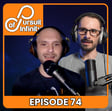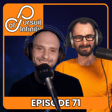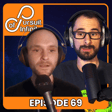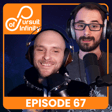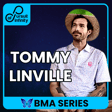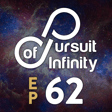Become a Creator today!Start creating today - Share your story with the world!
Start for free
00:00:00
00:00:01

39. Angel Hernandez
In this week’s episode, we welcome Angel Hernandez to the show. Angel is the founder of GriefX, which organizes support groups for people dealing the grief of losing a loved one. You can find him at GriefX.com where you can sign up for a support session.
https://griefx.com/
_________________
Music By Nathan Willis RIP
Follow Pursuit Of Infinity:
www.PursuitOfInfinity.com
Discord: https://discord.io/pursuitofinfinity
YouTube: https://www.youtube.com/channel/UCPpwtLPMH5bjBTPMHSlYnwQ
Spotify: https://open.spotify.com/show/58he621hhQ7RkajcmFNffb
Apple Podcasts: https://podcasts.apple.com/ca/podcast/pursuit-of-infinity/id1605998093
Instagram: https://www.instagram.com/pursuitofinfinitypod/
Patreon: Patreon.com/PursuitOfInfinity
Transcript
Podcast Introduction & Guest Introduction
00:00:00
Speaker
Hello and welcome to Pursuit of Infinity. In this week's episode, we welcome Angel Hernandez to the show. Angel is the founder of Grief X, which organizes support groups for people dealing with grief from losing a loved one. You can find him at griefx.com where you can sign up for a support session. But before we get to it for all things Pursuit of Infinity, visit our website, pursuitofinfinity.com. We have all of our episodes there and links for everywhere you can find us.
00:00:27
Speaker
So if you like what we do, head on over there and show us some support. We also really appreciate a follow or a sub as well as a five star rating and maybe even some kind words of encouragement in the form of a review. These things really help us to expand our reach and credibility, which is so much appreciated. And if you're feeling exceptionally magnanimous, you can become a patron at patreon.com slash pursuit of
Support & Follow Pursuit of Infinity
00:00:49
Speaker
infinity.
00:00:49
Speaker
where you can donate as little as $2 a month to support what we do. Check us out on YouTube. The channel is up and all of our episodes are there, so if you prefer some visuals and to put some faces to the names, subscribe and keep up with us. And we're also on Instagram, at Pursuit of Infinity Pod, so give us a follow and reach out. Again, all these can be accessed at pursuitofinfinity.com. And without further delay, thank you so much for listening and I hope you enjoy this week's discussion.
Angel's Personal Experience with Grief
00:01:40
Speaker
Hi, Angel. Welcome to the show. Hey, Josh, how's it going? I appreciate you coming on, man. Thank you. Thank you. And I appreciate you having me on as well. Of course. So let's talk death. What about death?
00:01:58
Speaker
affected you personally and affected you personally in such a way that led you to work with people who are grieving as a result of a death in the family or a death of someone close to them. Yeah, so you know throughout my life
00:02:15
Speaker
I would say my first major encounter with death was the death of my grandfather. And that did affect me, but I think it was a lot easier for me to process his death because he was already up there in age when it happened and also his health. He wasn't doing too well before he passed away. So it was easier for me to accept that.
00:02:37
Speaker
However, later on, I had some more tragic encounters. I actually had first two cousins that died. One was murdered and another one died because of health complications. And those affected me as well. But I was close to those cousins, but not as much as then what happened later on is that I lost another cousin.
00:02:58
Speaker
to suicide and that death really hit me hard because that cousin in particular I was very close to him and he was like a brother figure to me and that's kind of like the first time that I really struggled with grief because prior to that you know it did affect me but I was able to get through it but his loss like really threw me in a spiral that that you know I wasn't prepared for
00:03:20
Speaker
And, you know, it took me about a year to actually like, you know, for my, to come to the self realization that it was having a negative impact on my life, like how I was coping with it. And that kind of led me down the path of what I'm doing right now is helping others, you know, deal with these kinds of situations. So with each subsequent death in your life after your grandfather, was your view on death and how we handle it changed and altered?
00:03:51
Speaker
Yeah, I would say like, you know, it really made me think a lot about, you know, how there's no, you know, that there's no
00:04:03
Speaker
There's no linear path to how life works in general, right? Because with my grandfather's death, I guess it was kind of like, you know, the more cookie cutter explanation that we have to death where, you know, you reach a certain point in your life and then you transition on to the next, right? Because of old age or illness. But with the first cousin that died, you know, he was murdered, right? He was pretty young when he died. He was in his 20s.
00:04:26
Speaker
And then my other cousin, they were in their late 30s and they were actually just about to start a family when this tragically happened. And then we shift on to my other cousin, the one that was like a brother figure to me. He died by suicide. And that's something that I didn't really expect to have to deal with.
00:04:49
Speaker
And then it just threw me in for a loop. I was questioning what do I expect out of life? What am I supposed to do now? And all these questions, right? And then why? Why did all these tragic things happen? And then it led me down to just reanalyzing my views on life, death,
Impact of Loss on Life & Spirituality
00:05:14
Speaker
and
00:05:14
Speaker
you know, just everything, my worldview in general, right? Cause I really didn't think about death as much prior to that. I just, you know, I knew something, it was something that was there, but it's kind of like, all right, it's not something I should worry about yet, right? But I guess these, all these events kind of put me in a state of like paranoia to some extent, and that I was like more aware of it. And then that in a healthy way, initially, right? I didn't have a good relationship with thinking about death at first though. It was very nerve wracking, you know, to think about it.
00:05:46
Speaker
So what would you say was unhealthy about the way that you were thinking about death at that time? Yeah. So with, with the death of my cousin that, that died by suicide, you know, I, I was just, you know, really just disappointed in, in, in life in general, right? Like I was like, well, what's, what's the point of all this, right? Like that these kinds of things happen and there's no, you know, comfort in, in, in the situation. Right. And just.
00:06:16
Speaker
you know, questioning my own beliefs too, right? Because with suicide, like I had these, and I still battle with it too, right? Like, because of my religious upbringing, you know, which is primarily based off Christianity, right? To die that way is considered a sin, right? And there are, you know, these alleged consequences from
00:06:39
Speaker
going about this. So that just put me in more despair, thinking about like, wow, this person could potentially be suffering more if there is some sort of afterlife at these consequences. And now I would say,
00:06:57
Speaker
My religious beliefs have changed a bit. I would say now I don't subscribe to any particular religion, but I'm more open-minded about what happens. I haven't come up with a concrete theory of what happens in particular, but I think now I'm less obsessed with the outcome.
00:07:16
Speaker
I've learned to focus more on what I do have control over, right? And when it comes to death, like even my own mortality, right? I truly don't know when I'm gonna die, right? But I can just control like how I live my life while I am living, right? Because
00:07:36
Speaker
when it's my turn, it's my turn, right? I just don't know when that's going to happen. I think I became a little obsessed with that potential when I was going through this and also like just questioning, you know, death and the consequences behind it. And now I've learned to step back a little bit and just, you know, appreciate life more and also appreciate death too, in a way that is less fearful of a thing to worry about.
00:08:04
Speaker
and just accept it as a normal part of life. And not just death, but loss in general. We will encounter all types of losses in our life, not just death. The change of relationships, the change of environments, change of maybe even careers in some cases. These are all our loss of identity as we transition into other
00:08:27
Speaker
milestones in our life, right? Sometimes for some people they transition to becoming a parent or a caretaker or all these things, right? And when we transition into some of these things, we do lose a bit of our former self, right? And this is all okay because again, it's part of life, right? And I think I've learned not to be as frightened by these changes
00:08:53
Speaker
and to accept these losses and appreciate them as just part of the human experience.
00:09:00
Speaker
Yeah, yeah, life is change. And I mean, in the springtime, plants begin their fruition. The summertime, they bloom. The fall, they begin to deteriorate. In the winter, they die. This happens every year. This is the cycle of life. But it seems that when it's applied to humanity and when it's applied to people that you care about, there is a strong emotional aspect to it.
Founding of Grief X
00:09:29
Speaker
And which brings me to your project grief X And it seems that you were inspired enough by the death around you to start a program Where you can help other people to get through the trauma that death brings them So can you talk a little bit about how you started grief X and what exactly it is? Yeah, so when
00:09:52
Speaker
When I was going through the loss of my cousin, the one that was like a brother figure to me, it was the first time that I sought out therapy. So about the one year mark, I realized that I wasn't coping with it too well. I was really depressed and I was trying to hide that fact from other people and for myself as well. I was just trying to block that out. And I wasn't really doing too well in general. I was barely keeping it together emotionally.
00:10:22
Speaker
And I just, you know, I wasn't in a good place. So I decided to get some help. And, um, you know, I've, I've had always heard of, you know, therapy, right? But I never, uh, never really looked into it because I had dealt with depression before, but not, not to a point where, you know, I was able to manage it on my own. So I went to a therapist and one of the things that she recommended was, um, a support group, right? She said, you know, something you should look into.
00:10:49
Speaker
And I was familiar with the concept because I've heard about things like AA and stuff like that. But I thought those support groups were mainly for substance problems and stuff like that. I didn't really think that that kind of thing existed for these kinds of issues.
00:11:06
Speaker
So while looking for one, I had a hard time finding a support group that fit my schedule. So I kept looking and looking, and eventually I found this company that they did training sessions to host, like facilitate support groups in like a medical setting. So it was for like hospitals, hospice, and those kinds of environments. So I ended up taking that course, even though, you know, it wasn't really meant for like, you know, regular people, but you know, I'm a very hands-on person, right? I wanted to like learn more about what I was going through.
00:11:36
Speaker
So I took that course and then it was very, it was an eye-opening experience because I learned that a lot of people that, you know, were working with others dealing with this kind of thing, they were not well prepared to handle it, right? And it made me realize that even like, you know,
00:11:52
Speaker
in the professional world, like there's still a lot to be learned about this, right? And that there's a need to further the work that goes into this. So I did some other, you know, I read some more books, I did some more training, and then eventually I decided to give it a try and start my own support group. And that's kind of how Grief-X got started.
00:12:12
Speaker
And it's been an interesting journey because I've learned a lot also from just our participants. People share their stories, what works for them, what doesn't. And I'm always learning more from others. And the thing I like to promote is that I'm not a grief expert at other people's grief. We can only be grief experts at our own grief. So what I try to help people is become a grief expert at their own grief.
00:12:39
Speaker
Because at the end of the day, only you know what works for you, what doesn't, what's effective, what's not, and you kind of have to learn also to adapt to the situation that you're in, right? Because our needs change as time goes on. So I really promote that philosophy to the people that attend our groups. And then I also really encourage people to talk about it, right? Because while there are things that might not help everyone,
00:13:07
Speaker
I've yet to encounter someone that has told me that talking about it hasn't helped them. So I'm very confident in saying that if you're really stuck and you don't know what to do, just talk to someone about it. It doesn't have to be a professional, just anyone willing to listen that helps. It's not going to make the grief go away necessarily, but it will help you get one step closer to coping with it better.
00:13:34
Speaker
So is your work mainly concerned with people who are grieving post the death of a loved one, or do you also deal with people who are, um, like spending time with a dying person or helping someone to transition from life to death?
Challenges in Grieving & Support Groups
00:13:50
Speaker
Yeah. So it's primarily, um, the aftermath. Um, and in some cases too, even though I would say like,
00:13:58
Speaker
probably like 60% of our participants are dealing with losses related to death. But then we have another 40 or so that are also dealing with other losses. So it might not be death, could be breakups, divorces, so things of that nature as well. Because even though those losses are not associated with death, in a way, it is a death of something else, right? When you're going through a breakup or a divorce, it's a death of a relationship, right?
00:14:26
Speaker
And in many other cases too, if you really think about it, it's a death of an identity, right? Because prior to this relationship ending, you identified yourself as part of this relationship, right? So you held a different role. And now this has been taken away from you. And now you have to kind of start fresh in your new identity, right? So I think in those cases,
00:14:52
Speaker
It's not just the death of a relationship when it comes to divorce or breakup, but it's also a death of your prior identity.
00:15:02
Speaker
Yeah, I love that because I think a lot of people when they look at the aftermath of death, they want to look at things in a way where, uh, they get things back to what they were when things were normal. And I, I think a better way to look at it is, um, to feel yourself within the new person that emerges from the experience of having someone die. That's close to you. Right.
00:15:30
Speaker
So do you do at all any kind of work with people who are in the process of dying or people who are dealing with someone who is in the process of dying? No, that's not really what we deal with at the moment. So what do you feel is like some of the most common themes that you notice that people come to you with, like some of the most common problems that they see manifesting in their lives without the person that they've just lost?
00:16:00
Speaker
Yeah, so a lot of times, you know, just people are not comfortable talking about it, right? And they feel kind of lost. And I think for a lot of people, they kind of had the same problem that I had initially was just opening up about it, right? Because, again, like, this is something that I feel like as a society, like, we're not really well equipped to deal with, especially in Western societies, right?
00:16:25
Speaker
So again, we're familiar with getting help for substance abuse and health issues. But when it comes to mental health, I think we're still lagging behind a bit. And then also to some extent, we've come a long way now in promoting positive mental health advice and things of that nature.
00:16:48
Speaker
but it's it's easier said than done right even with things like you know like for example like all these hotlines that exist right the suicide hotline and whatever these things don't necessarily um provide ongoing support it's kind of just like uh
00:17:04
Speaker
you know, it's just a stepping stone, right? There's still a lot more work that goes into it. So I think a lot of people, they're just lost in how to deal with it in general, right? And even like, you know, with like the advice that therapist gave me, you know, she was like, Oh, like find a support group, right?
00:17:20
Speaker
But it wasn't easy. I did find some, but a lot of them didn't meet my schedule. And then also, there's also these financial constraints that exist. A lot of mental health resources do cost money. And in my case, I was fortunate enough that I was able to afford the therapist that
00:17:45
Speaker
to do all these other things, but not everyone is that fortunate, right? And also when you're dealing with some of these losses, you might also be dealing with financial hardships as a result of them, right? Say if your spouse just died, you might have to deal with the financial costs associated with that, right? Because not everyone
00:18:05
Speaker
has money set aside to handle these affairs. So there's these other logistical issues that people don't consider when they give blanket advice like, oh, I get help. But help generally costs money. And you're dealing with all these things on top of that. And then in some cases, there's other barriers. So to give you a real example,
00:18:32
Speaker
I don't really consult with my therapist too often, but occasionally in the past when I've had to make an appointment with her, it's not easy because she's often booked already, so I might have to wait. It's not even that I can't afford her session. I'm willing to pay her fee, but she's just not available.
00:18:55
Speaker
So, all these things exist. And I was also fortunate that I got pretty lucky in that my first consultation was good, right? Some people, you know, they try therapy out and they have a bad experience, right? Because they get someone that's not a good match, right? And this can be, you know, very disheartening, especially, let's say you're struggling financially, right? So, you know, you put all this money aside to pay for the session and it doesn't help you. You feel even worse now, right? Because now,
00:19:25
Speaker
you know, you have this financial loss and then also the help that you got is not really helpful, right? And, you know, it's not easy getting help. And I think a lot of people, they're just clueless of how to go about it, right? But again, I think, you know, talking about it is a good way to get the process started, right? Because that kind of opens the door for you to start, you know, getting
00:19:54
Speaker
Into the mindset that this is something that that can be resolved right and again It's not an easy process, but I think talking about it is the first step to getting there You mentioned that In the Western world here, we don't really associate death in the correct way And we don't really have a society with a foundation that supports people who are going through this type of grieving process So why do you think that is?
Cultural Attitudes Towards Death
00:20:23
Speaker
Yeah, I think a lot of it has to do with just the fact that it's still a discomforting thought for a lot of people. And we're also just conditioned to not deal with hardships. I think this whole COVID situation was a big wake up call to the realities of death and loss.
00:20:48
Speaker
Because even if you were fortunate enough not to lose anyone to COVID, you for sure lost something, right? Even if you didn't lose your job or your career or anything like that, like you did lose your freedom to some extent, right? No matter where in the world. So it was like a global thing where everyone felt some sort of loss, right? Because for sure, COVID had prevented you at some point from doing something that you enjoyed, right?
00:21:15
Speaker
So I think, but again, people forget that there are other people less fortunate than us that deal with these kinds of struggles all the time. I mean, there's people where they live at, they don't have enough
00:21:32
Speaker
their supply chain isn't as good as ours. So for example, countries like Venezuela, they struggle with supply chain issues. So even though people have money to buy stuff from the supermarket, there's not enough supplies there. And then other people in countries where they're hit by tropical storms and things of that nature, or even right now, what's going on with
00:22:00
Speaker
the Ukrainian and Russia situation with the war. There's people experiencing death all the time, all kinds of other losses associated with that. So that's just the way the world works. But I think particularly in the United States, we're very fortunate that we don't deal with a lot of these issues.
00:22:25
Speaker
Even right now, let's say hypothetically, we were to get more hands-on involved in the war. It's highly unlikely that we would see combat on our soil. I mean, of course, maybe people that are in the military would for sure seek combat, but that's abroad. It's very rare that we see warfare on our actual soil. Historically speaking, that hasn't happened for a very long time.
00:22:53
Speaker
So again, even then, we would be shielded from that fact. But people in other countries, they're not so fortunate about this. They actually see buildings getting torn down and they see all kinds of bloodshed firsthand, which were shielded from here in the West.
00:23:13
Speaker
was actually doing some research, you know, just to refresh myself before we came on this call. And I typed in just, you know, just for the hell of it, I typed in like the human life cycle on Google images, right? And it was kind of interesting. So I saw a lot of pictures that didn't show death, right? I guess it was meant for children, but a lot of them omitted death. So it was like, it showed the fetus, and then, you know, being a child, being a teenager, and then just elderly person, and it ended right there, right?
00:23:42
Speaker
But, you know, it's like, no, there's there's another step that that you're missing. Right. So, you know, it's interesting how we just kind of.
00:23:52
Speaker
try to put it out of sight, out of mind, but it doesn't work that way. It's something that's part of life. And I think some other cultures do a better job at integrating that. And even just that conversation, I'm fortunate enough that my parents, they're both still alive, but they have talked to myself and have a sibling.
00:24:13
Speaker
about how to handle their death as far as some logistical stuff. So we've had that conversation. And also, I've talked to my parents about what if I die? And my sister has also talked to us about what happens if she dies. So we do have some sort of plan. And of course, it's going to hurt when it happens. But at least we've had this conversation. But a lot of people don't have this conversation in their households.
00:24:42
Speaker
And even right now with the person I'm dating, we've discussed this as well, because we don't have a family yet, but that is a goal of ours. And when we get to that stage, we will definitely be having conversations about this, because it's something that you have to be prepared for, because it is going to happen at some point.
00:25:06
Speaker
Yeah, it's funny you bring up the pictures that you saw on Google because it really does seem like we just ignore death. We just are so scared to think of it because it means the loss of either someone that we care about in the physical form or the loss of our own ego and who we think that we are in terms of our own death. And it seems to me like it's a spiritual problem, which is why, like you said, I think a lot of other countries, a lot of other cultures handle it in a more adult and responsible way.
00:25:37
Speaker
Because they seem to revolve their spiritual beliefs around The process of dying and then what happens after death so has this experience Working with people who are grieving and the experience of having people close to you die. Does that Change your beliefs spiritually and does it change what you feel like happens after you die?
Evolving Spirituality Through Grief
00:26:01
Speaker
Yeah, it has I think now a bit more
00:26:06
Speaker
open-minded about the possibilities of how the afterlife looks like if there is one. I think I've always believed in an afterlife, but I think before I had settled more on a particular idea. But now I think I keep more of an open mind. But again, I still
00:26:31
Speaker
having decided on a particular outcome that I feel much confidence in. But overall, though, I think what has changed the most is just that I'm not as obsessed about what that looks like. I think I've just come to realize that while I may have some theories that seem very plausible to me, at the end of the day, I won't know until it happens.
00:26:57
Speaker
whether you know whether there is no afterlife and we just die and it all ends there or whether you know there is some sort of other realm that we answer or maybe we you know we reincarnate I don't know right and I think it's okay that that I don't know right
00:27:16
Speaker
I think before I was more obsessed with like, you know, I have to know the answer. And I think now I'm getting to a point where I'm not as concerned about what the answer is. You know, I just accept that I truly won't know until it's my time, right? And that's not to say that, you know, I'm still not curious about it. I am curious about it. I'm still, again, I keep an open mind, right? So, you know, if,
00:27:46
Speaker
If I come across material that suggests otherwise what I believe in or supports what I'm currently trying to lean towards, I will indulge in those thoughts. But I'm not as obsessed as I was before in having to know what happens. Because I think at the end of the day,
00:28:03
Speaker
you know, we have to focus over things that we do have control over, right? And I don't have control over what happens in the afterlife, right? To some extent, right? I just have control over my own life, right? And I just try to focus on that these days, on what I can do while I'm still alive, right? That doesn't mean that I don't
00:28:24
Speaker
respect possibilities that may incur, right? But I feel like it's not healthy to dwell on that too much because then you become obsessed with something that you truly have very little control over, right? And instead it's better to focus on that energy on things that we do have control over. And I think also I've learned to be more respectful towards other people's beliefs about those things because I think it's very easy to become biased, right?
00:28:51
Speaker
I think that's also something that's very unfortunate in today's society is that, you know, people, especially now, like, you know, it seems that everyone's on an extreme level, right? And I think we should try to, you know, be more open-minded because yes, maybe in some cases, some people are wrong, right? But again, like, we cannot, we should still,
00:29:18
Speaker
give other people a chance to have a discussion about it, right? And everyone is entitled to their opinion. And I think right now, everyone's kind of like on the edge and that causes a lot of conflict, right?
00:29:33
Speaker
It creates a divide when it comes to especially issues like the afterlife. It's very tricky because no matter what you believe in, truly the proof lies in getting there. That's the only way we'll know for sure.
00:29:53
Speaker
Yeah, it seems to me that whether or not it's right or whether or not someone else is right or wrong about it doesn't really matter. I think just a deeper understanding of death will benefit us in any way, shape or form, even if our ideas about it might not match other people's or might not match other ideologies. But do you find that in your work relating death to spirituality helps people or do you find that it's not related in integral part
00:30:23
Speaker
Right, so I try to keep a secular view in general in how I run my organization. However, what I do is I do themed discussion topics during certain sessions, right? And one of those topics is spirituality, right? And in these sessions, we kind of touch upon more spirituality. However, in the general meetings, I don't really push any belief systems.
00:30:54
Speaker
I always encourage people, even in the meetings that don't revolve around spirituality, to bring it up if it's relevant to the discussion and if they find that it helps. So if someone wants to share that praying helps them or things of that nature, then they're allowed to talk about it. But I don't revolve the topic around spirituality or I don't push any ideas
00:31:22
Speaker
revolving around that in the general meanings because I think that, you know, it's tricky to do that effectively, right? Because then, again, because there's this big divide, like you said, that, you know, people have their own notions. And when we start to push certain ideas, it may, it may
00:31:41
Speaker
make other people feel alienated from it, right? And grief is already a complex thing to deal with. We don't need to complicate it even more. And I think it's better just to focus on the common ground than on the differences, right? Because again, at the end of the day, I mean, I can't, you know, I can't say that what I believe in is correct, right? Because it's very difficult to prove that.
00:32:02
Speaker
So to spend time making someone else feel bad that they believe differently is not beneficial. So instead, when we do talk about spirituality, I do share some of my beliefs and I let other people share their beliefs, but we kind of try to avoid trying to push the idea that anyone in particular is right or wrong. It's more or less like, okay, we give them a platform to express what is working for them. And in some cases,
00:32:32
Speaker
They can also talk about how spirituality may also be an obstacle for them, and just creating a safe space to talk about this relationship between the loss and spirituality. Yeah, that's a good point. I could definitely see the spiritual aspect of understanding death being an issue for people.
00:32:54
Speaker
because if you don't have a grasp on what it is you think happens when you die or While someone is dying and you don't have like an understanding of how that's going to affect you and how you can take steps to Alleviate that grief. I definitely feel like it could be an issue But do you do you have any help with this or do you do this all on your own?
Global Grief Support Operations
00:33:21
Speaker
Yeah, so at one point I did have another member that was helping me run meetings. However, their life circumstances changed a bit and they got busy. So right now I'm running the meetings on my own. However, we do certain meetings that
00:33:38
Speaker
people that have attended the group a few times, they kind of have a gist of how it works. So we have what we call self-moderated meetings. And these meetings are just run without a formal moderator. So people that have attended the group a couple of times, they can attend these meetings and they kind of run themselves, right? And those meetings are self-sustainable. And then we have the other meetings that are led by
00:34:07
Speaker
by myself. Yeah. And are these in person? Are they online or both? Right now they're all online. So the way the group got started, actually, we're based out of New York City. So we're doing meetings in person. But then when the pandemic started, I transitioned to online and it's
00:34:29
Speaker
It's been an interesting transition because when I went online initially, I was just, again, only promoting it locally. But now I promoted to other people as well. And we have participants from all over the country and sometimes even from abroad. We've had people from Europe or in Canada joining us as well.
00:34:50
Speaker
It's always interesting to see how people from other countries deal with it and what unique challenges they have. As of right now, it's online-based and we do plan on resuming the in-person meetings, but that won't shift away the focus from the online because I think opening up the platform to everyone is very helpful. We'll continue to offer support online.
00:35:15
Speaker
At some point, we will revisit doing in-person meetings when it makes logistical sense to do so. But it'll be a supplemental thing. It won't replace the online meetings.
00:35:29
Speaker
Yeah, it's amazing to be able to open it up to the world and to experience, like you said, the differences between how other cultures from different places handle grief from death. Are there any noticeable differences that you can think of between different cultures and how they have approached death within your meetings?
Grief Resources in Different Countries
00:35:52
Speaker
Yeah, so I would say I would primarily
00:35:56
Speaker
I primarily have experience with our Canadian participants, because that's where most of our foreign participation comes from. And over there, they seem to have resources that we don't have available. So actually, what happens is that there's a lot of statewide programs that are specific to certain states. So for example, in New York City,
00:36:24
Speaker
they're fortunate enough that they do have, you know, help lines to help with like mental health issues, right? But in some other cities that they don't have that kind of thing. Whereas Canada though, they have like, it's just like a federal program where it's a call on that any Canadian can call. And they actually have like this, you know, the system where you can set up and everyone is entitled to an appointment with a counselor.
00:36:50
Speaker
And there is a restriction like I don't remember off the top of my head, but I believe you can only make one appointment for every so often, right? But at least I mean it's something and it's totally free, right? And it's pretty helpful also, right?
00:37:05
Speaker
Which is which is another important thing because you know sometimes you know people have good intentions when they make resources right but it's They're not always helpful right because a lot of again a lot of these resources like they were not made with With certain things in mind. It's just a general help and I think people dealing with with grief sometimes
00:37:30
Speaker
need like particular attention, right? And a lot of like the general resources that exist out there may not be a good fit. But from what the Canadian participants have mentioned, like, you know, the stuff they have available over there is pretty helpful. So yeah, and then also, you know, there's other groups too. A lot of people, you know, they ask like, how do I find, like, if they want to find an in-person group, how do I find one? You can contact like your,
00:37:59
Speaker
local funeral homes, right? They often have some resources. Also, hospitals also can be helpful. And then if you lost someone that was in hospice care, you can also contact that hospice and they can maybe give you a referral. But also, it's a lot of legwork to get
00:38:20
Speaker
this type of help. It's not easily accessible. You have to dig in. And then again, not every resource is free. Even with support groups, the help we offer is free.
00:38:32
Speaker
But there's also paid support groups that you have to commit to a certain series and you have to pay the fee for that. And that also can restrict certain people because they may not have the funds for it. Or even if they can afford it, they can be put off by the fact that they have to commit to this series because a lot of them are not dropping.
00:38:55
Speaker
So, you know, you pay X amount of dollars, but you have to commit to like, whatever, like four or five sessions. And, you know, people are concerned that, you know, it might not be helpful. So that might put them off from from seeking this help. So, you know, that these obstacles exist. And again, when I mentioned before, also about, you know, the whole therapist hunt, you know, that you might find you might have a hard time finding a therapist in general. And then when you do find one, they might not be a good fit, right? Or if they are a good fit,
00:39:24
Speaker
you might have run into the problem that, you know, depending on your situation, you might need ongoing support and there's a schedule might not, you know, might not make that feasible. So, you know, there's a lot of things that occur that, you know, when people recommend, you know, get help, they don't really address, right?
00:39:49
Speaker
Yeah, and I've noticed that I mean, when I was in school, when I was young, you know, I feel like everybody who is, who spends time in a public school is going to have somebody from their class or from their school, someone who they directly coexist with.
00:40:06
Speaker
pass away. And when I was in school, there were some pretty decent programs, you know, that they would have during the school day if you needed to leave your class and go talk to someone, they would have that available for you. And it seems that that's increasing now with our culture. In schools, they seem to be adhering to more protocols to help people to grieve when they have
00:40:35
Speaker
deaths in the family or deaths within their classmates, deaths within their peer group.
Grief Support in Schools & Workplaces
00:40:42
Speaker
So do you see people who are younger, like children, young adults who are dealing with that kind of thing, or do you only deal with like adult? Yeah, we primarily deal with adults. So most of our participants are, you know, like
00:41:02
Speaker
early 20s to upwards. Yeah, so we don't really deal with children. However, some people that do attend our meetings, they do have children and they kind of share what their children are going through. But directly, I don't work with children. Also because of the nature of what we're doing, especially online, like a child getting
00:41:27
Speaker
them involved would be difficult because of legal concerns. So it's mainly geared towards adults. But yeah, but as you mentioned, though, that yes, I think there is some improvement as far as, you know,
00:41:42
Speaker
raising awareness. And in some cases, some school districts are doing a good job. And even in the corporate world, too, actually some companies do actually have a bereavement leave. So that which is nice. But from my understanding, that's not common. So we still have a long way to go when it comes to that. And then I applaud the companies that have that kind of policy because it's much needed.
00:42:14
Speaker
Yeah, usually a lot of those policies don't go far enough in my opinion because grief is so personal and the stages of grief are real and it takes a lot of time to go through that for some people and each person may get caught on different stages and spend more time there.
00:42:32
Speaker
Um, and it's just such a personalized form of treatment that I feel like you definitely need to, like you said, give people this, uh, this personal involvement and personal help really hear their story. Um, was there anybody in your life who really heard your story and gave you that personal help that you needed when you were dealing with death?
00:42:58
Speaker
Yeah, I wouldn't say like any particular person, but I would say for sure just getting more comfortable talking about it helped a lot. And I remember like vividly like when I talked to the therapist about it, like
00:43:14
Speaker
I had a really hard time doing that. I was tearing up and breaking down. And then after that, I think it just gave me the courage to start talking about it. And then from there, I just started talking to other people I knew about it. And then eventually, I just got really comfortable in just talking to anyone about it. But it was a process.
00:43:36
Speaker
But yeah, I do appreciate a lot that therapist that I had that made me feel safe in sharing my story and just made me feel that it was normal. But also, you have to do the work yourself.
00:43:53
Speaker
And again, it's one of those things that it's easier said than done because it's very painful to talk about your loss when you're dealing with it. And I remember the first support group meeting that I held, I was scared that I would start breaking down while introducing myself. Because at that point, I had made progress, but I was still
00:44:21
Speaker
I was still struggling a bit more than I am now. But yeah, it was good though to be surrounded with other people that can relate to you, right? And I think that sense of community is very helpful.
00:44:36
Speaker
And one advantage that you often get from these peer-led groups though is that you can hear other people's stories and you can relate to them. Whereas most therapists, even if they have lost someone, they'll kind of refrain from sharing their personal stuff for numerous reasons.
00:44:57
Speaker
And I understand the reasoning behind that, but also I think that limits the experience a bit. I think sometimes it's necessary to hear out the other person's story. And that's one of the advantages of attending groups like what we do is that you can hear other people's stories and you can relate to them, even if their loss is different.
00:45:20
Speaker
And sometimes, you know, we get like a mixed bag, like, you know, people have all kinds of losses, like there's people, maybe someone lost their child, another one lost their spouse, another one is going through a divorce, right? And, you know, all these losses, you know, they're, they're different, but they're still all losses, right? And, you know, we bond over the fact that, you know, we're all going through
00:45:44
Speaker
through these losses and through grief, even as painful as it is, it brings us together and it makes us appreciate life and just be more compassionate towards each other, that we're all dealing with that.
00:46:02
Speaker
And I think another issue that people struggle with is just comparing their grief, right? Because as you mentioned, grief is an individual experience, right? And a lot of times we try to protect
Misconceptions About Grief
00:46:16
Speaker
other people's experiences on us or vice versa, other people project their experiences on us. So sometimes someone that went through a similar loss will reach out to us and they may say some hurtful things. And it's not with bad intentions, it's just that they dealt with it differently. So a common situation is we get a lot of people that lost a spouse.
00:46:41
Speaker
So a lot of people will get suggestions about starting to date again. And that can be very hurtful for a lot of people because they're not ready for that. And in some cases, it's just people have zero interest in that, which is fine because they have to see what's right for them. And other people, they may have good intentions and they suggest these things. Or some people are very aggressive. Some people have mentioned that someone will actually try to set them up on a date with someone.
00:47:11
Speaker
And again, it's not that the people want them to feel bad. It's that they think that's going to help. But they don't really understand that that person is not at that stage yet. So maybe in the future, they might be open to dating. Or maybe not. Some people, after losing a spouse, they just want to stay single. And that's OK. Because again, it's an individual choice and an individual journey.
00:47:39
Speaker
Yeah, not everyone is the same. Um, how old were you when, uh, your cousin died? That was very close to you. Yeah. So I was about five years ago, so I was 27. I want to say. Okay. Okay. Yeah. So you did have sort of an adult mindset, a foundational understanding of the world around you. Um, cause yet it seems to me that when people die,
00:48:08
Speaker
in your life. When you're a lot younger, I think it's really hard and very detrimental to your development and your growth. But one of the
00:48:18
Speaker
most important things in my view, um, in terms of how death affects you is, uh, whether or not it's a shock. The age at which the person passes away, because if, if like your grandparent passes away and, uh, it was a peaceful transition and they were in their nineties and, you know, they were slowly declining over time. I feel like it's an easier thing to accept because you can start to understand the life cycle and you can see, okay, this is what happens to everyone. And.
00:48:48
Speaker
It gives you some time to work through the grief that it may cause. But when someone dies suddenly, whether it be a car accident or like in your cousin's case, that has to be so much more traumatic. And I'm sure that the people who come to you, I would think that more of them who are having really, really tough times are ones who have been dealing with death that was more sudden or someone younger dying. Do you feel like that's true?
00:49:19
Speaker
Yeah, I would say, generally speaking, those people would have a harder time. But sometimes, too, even people that lose a parent that's at that stage of life where it's more expected, they're still struggling really hard because it's a big loss for them. And I think, again, a loss is a loss.
00:49:49
Speaker
And it's like people's relationships to that particular person is so unique that it's really hard to imagine what that particular person is going through. We could always sympathize with them, but I feel like when you go through any type of loss, no matter the circumstances, there's a big puzzle that's there and that piece has been removed permanently.
00:50:18
Speaker
no matter what, you know, now it's an incomplete puzzle, right? And nothing can replace that. And yes, you know, in some cases, you know, people say in the loss of a spouse or, you know, a relationship where it's a divorce or breakup, you know, you may date again and remarry and whatnot, right? But again, that
00:50:41
Speaker
That's a new puzzle being created. It's not the same one. People mistakenly think that new person is that missing piece that was lost before and it doesn't work that way because these people then create a new experience with the other person. It's a unique experience. It's not a replacement of the old one.
00:51:05
Speaker
And in the case of like a parent or sibling, that's a very unique connection, right? Because you only have one parent or one sibling, like that particular parent, that particular sibling.
00:51:17
Speaker
So yeah, I would say what happens is though that maybe there's a unique challenge or not unique challenges, but special challenges that you encounter when you're losing someone that's younger or unexpected stuff. For example, like a parent burying a child, for example, that one kind of throws people in for a loop, right? Because that's not something you expect. You expect your children to bury you and not the opposite.
00:51:40
Speaker
So when that happens, you know, there's these unique challenges that are particular challenges that come with it. But yeah, I mean, everyone's everyone's hurting, no matter what they're going through.
00:51:55
Speaker
Yeah. Yeah. When someone has to bury their child, that is so terrible because it seems to me that's like throwing off the natural balance of things, you know, so you have to contend with so much heartbreak and so much grief. Cause it just doesn't seem like that should be the way things go linear, like linearly, uh, you know, in life.
00:52:15
Speaker
But as we begin to sort of wrap up here a little bit, I wanted to ask you with your work and with everything you've been through and everything you've experienced and taken in, where do you think we as a society could improve the most in terms of grief involving death?
Importance of Discussing Death & Loss
00:52:39
Speaker
And what do you see the future being like in terms of the help that people have access to?
00:52:47
Speaker
Yeah, I think we need to be more open to having this discussion about, you know, death and loss, right? And I think it needs to start at an early age, right? And I think it has to become less of a taboo subject, right? Like, at the end of the day, with certainty, I can tell you that, you know, everyone listening to this is gonna die at some point, right?
00:53:09
Speaker
And while that may sound morbid, it's really not. It's just a fact of life, right? Just how we're alive right now. At some point, we won't be, right? And that's okay, right? And unfortunately, in some cases, you know, some of us will die tragically or maybe if we don't die tragically, someone that we love will or, you know, or whatever the reason that may be.
00:53:32
Speaker
And yeah, these things will be unfortunate and it will cause a lot of pain, but again, it's death and loss as part of the life cycle, right? And these are things that we have to be more comfortable in discussing.
00:53:46
Speaker
And I think just having an open mind about being able to talk about it helps. Because again, when we go through the motions of when it finally happens to us and we're put in this situation aware, we need to face it. Just if everyone was on the same page, I think it would be a lot easier to deal with it. Because you could just talk to anyone about it. But right now, because it's such a taboo subject, or not even a taboo, it's just a discomforting subject for many people.
00:54:15
Speaker
It's a lot harder to process it because you feel more alienated. So I think if it was a common thing, it'd be easier. It's like when COVID was happening, I think people were more open to talking about how the pandemic was affecting them because everyone was going through it. It wasn't a private thing. Everyone was dealing with COVID. So I think it brought a lot of
00:54:37
Speaker
openness to the conversation. So just how that conversation started, I feel like we should be more open to talking about death. And as far as the future is concerned,
00:54:51
Speaker
Yeah, I mean, I would like to think that eventually when I type in the human life cycle in Google images that I do see that there, right? And that, you know, that it's not shielded, you know, that it's out there. But also that, you know, people don't see it as such a dreadful thing, right? And of course, you know, it is sad when you lose someone. I won't deny that, right?
00:55:16
Speaker
You know, honestly, the people that come to our meetings, like whatever loss they had, like they will always remember that loss, but ideally they won't constantly be suffering from it, right? The way of looking at it is like, you know, when you're going through grief,
00:55:33
Speaker
in the early stage, it's like an open wound, right? And eventually you get to a point where it's just a small scar, right? So, you know, once a wound closes, it doesn't really hurt you, but it leaves a scar, which is a reminder, right? So we'll constantly have this reminder, but ideally we just get to a point where, you know, we're a grief expert at our own loss and we kind of learn how to cope with it, right? And in some cases even, you know, learn something from it, right? And, you know, use it as
00:56:03
Speaker
And just remember that it's part of the life cycle and it's an experience, right? Like losses are part of life, right? And it's something that can be managed, right? And it's not something to be feared. So hopefully we'll get to a point where we're closer to that.
00:56:24
Speaker
And I think, you know, if we look back at history, there were some interesting trends that kind of went away. So actually, I went to this seminar some years back where this guy was talking about mourning jewelry, right?
00:56:41
Speaker
And there was this practice that at some point in history, people used to wear jewelry, not just at the moment of the funeral, but afterwards to show that they were mourning. And for some reason, this practice eventually went away. So I think at that point in history,
00:57:00
Speaker
people had a different relationship with loss and death. And maybe we'll see a comeback in these kinds of practices to remind people that it does happen. And yes, it is unfortunate, but
00:57:16
Speaker
It's just something that we all have to deal with and that once we open up the discussion, I think we can all be more compassionate for each other. So when it is your turn to deal with it, you can just talk to anyone. Whereas right now, it's like you really have to think about who you bring it up with because we're so shielded from it. And some people too.
00:57:39
Speaker
They're scared, like he's mentioned, they're scared to talk about it. And they think that when you talk about death, it's going to cause their own death. It's not a disease or anything like that. It's just something that happens.
00:57:52
Speaker
It's a necessity, right? It's like going to the bathroom, right? It's one of those things that we have to do as humans, right? And no one likes talking about that, but it happens, right? So just how we all have to purge our waste out. We also have to, at some point, transition into something else, right? Whether it's nothingness or another soul or whatever you believe in, it's part of this transition.
00:58:22
Speaker
Yeah, there's a quote from a spiritual guru from Das, who I bring up a lot on this podcast. And he says, death is perfectly safe. It's like taking off a tight shoe, which I think is a beautiful quote.
00:58:37
Speaker
And as we grow and as we age, death is something that is inevitable. We're going to have to deal with it in one shape or form, whether it be our own death or other people's death. Uh, which is why I think your work is so important.
Contact Information for Grief Support
00:58:51
Speaker
Um, so if people want to get into contact with you or if they want to attend the grief X meeting, where can they find you?
00:58:57
Speaker
Sure. Yeah. They could find us online at griefx.com. So that is the word grief and then the letter X together.com. And then there's a link there for our online meeting. So they could click on there right now at the moment.
00:59:12
Speaker
We're using Meetup to facilitate that. So if you don't live in one of the cities that's on there, just pick the city closest to you, or worst case, choose the New York City one, and then you could join us online. So that's the best way to participate in the online meetings if anyone listening is going through that. And then we also have some general information on our website, too, some resources that might help you if it's something you're struggling with.
00:59:41
Speaker
Fantastic. Well, Angel, thank you for all your work. Thank you for what you do, for what you're sharing with the world, and thank you for coming on the show today. Thank you for having me on, Josh. It was a pleasure speaking with you.
01:02:26
Speaker
you







